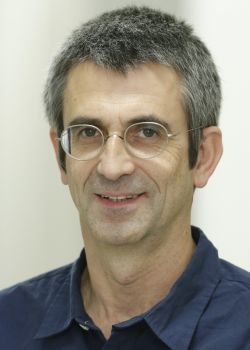Prof. Dr. Stefan Müller
Stefan Müller studied pharmacy at Ludwig Maximilians University in Munich before moving into life science research. After graduating, and following his genuine interest in molecular mechanisms underlying pharmacological and physiological effects, he abandoned the classical career path of a pharmacist. Instead, he took a deep dive into basic science and pursued a PhD in biochemical endocrinology at University Hospital Hamburg-Eppendorf. Stefan first came across SUMO during his postdoctoral studies in the group of Anne Dejean at Pasteur Institute in Paris. Ever since, the molecule that he himself once dubbed as ‘ubiquitin’s mysterious cousin’, dominated his scientific interest. In 2001, he returned to Germany to start his first independent group at the Max Planck Institute of Biochemistry (Munich-Martinsried) in the Department of Stefan Jentsch, before accepting a professorship at the Institute of Biochemistry II (IBC2) of Goethe University Frankfurt in 2011. Since 2016, Stefan is also the acting managing director of the Gustav Embden Center for Biological Chemistry, of which IBC2 forms an integral part. Stefan is dedicated to delivering highest quality of student education. He is responsible for teaching curricula in biochemistry at the medical faculty and is leading the Frankfurt Summer School for Medical Students. Stefan investigates post-translational regulation mechanisms in mammalian cells and their impact on nuclear organization, gene expression programs and ribosome biogenesis. His general focus is on the small ubiquitin related modifier (SUMO) system, which plays a major regulatory role in these processes. As a postdoc with Anne Dejean, he was the first to discover that SUMO determines the organization of PML nuclear bodies and the degradation of the oncogenic fusion protein PML-RARα in response to the anti-leukemogenic drug arsenic. Over the past decade, his team played a major role in revealing how the dynamics of SUMO conjugation and deconjugation shapes multiprotein complexes involved in ribosome biogenesis and epigenetic regulation. A main focus of his research is on dissecting the mechanisms of SUMO-mediated protein-protein interactions. His group has elucidated how SUMO recognition domains in target proteins interact with SUMO, thereby controlling cellular signaling pathways. He revealed the regulatory roles for phosphorylation and for acetylation in this process, adding a next layer of complexity in SUMO network control.
